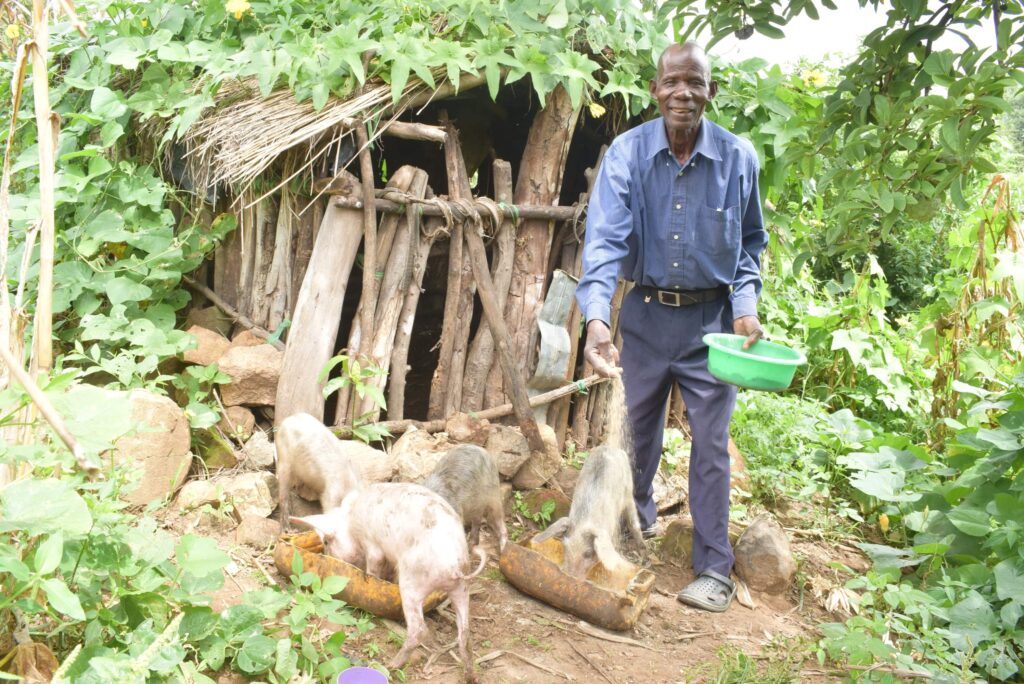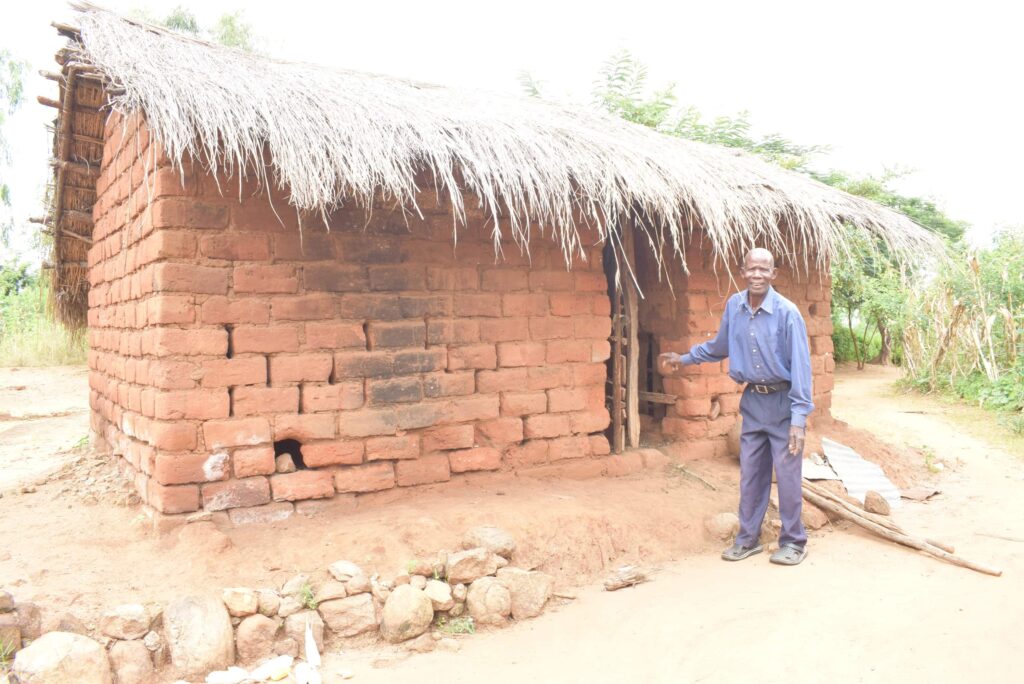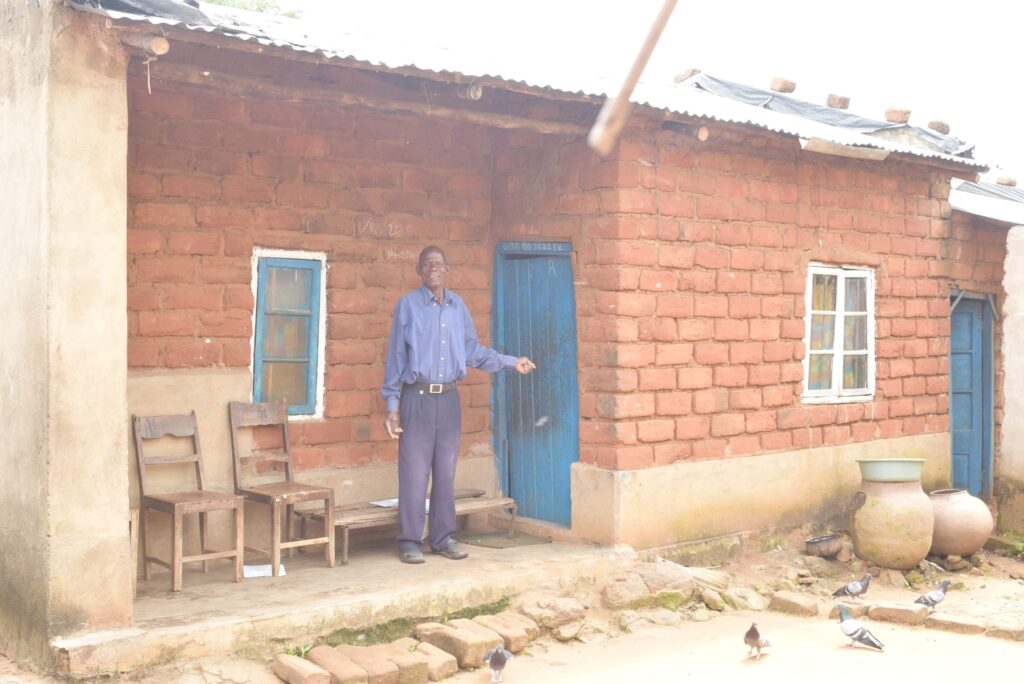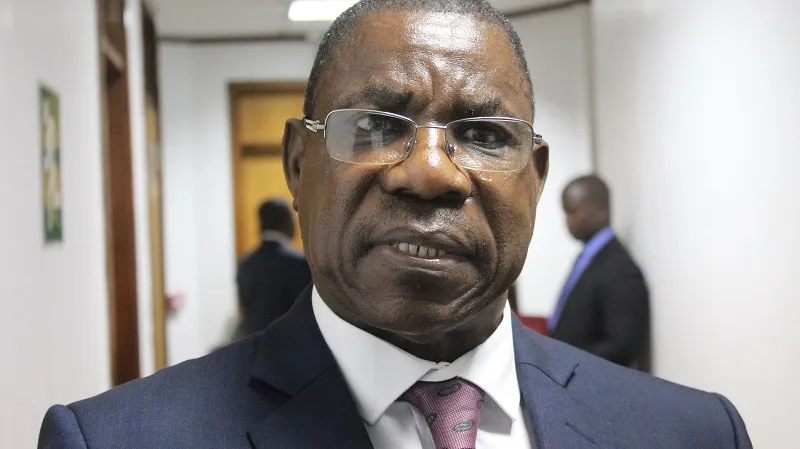By Memory Chatonda

Blantyre, Mana: Soon after he lost his two children, Tambala Makungwa adopted his three grandchildren; adding another responsibility to his family that was already struggling to sustain itself.
The seventy-two-year-old says since there was no one to look after them, he had no choice.
“I knew that these were my direct grandchildren and the responsibility of raising them rested on me,” Makungwa recollects.
“We were only having one meal a day. Sometimes I feared the worst for my grand-children that they could suffer malnutrition.”
Besides, eating inadequately, Makungwa who comes from Kandiwo Village in Traditional Authority Kapeni in Blantyre recalls living in a small and dilapidated house that profusely leaked whenever it poured.
He says ragged mats offered comfort of sleep to the family members.
“When we experienced chilly weather at night, we used to set a fire at the corner of the house, to keep the room warm,” says Makungwa whose plight was further compounded by his inability to engage in casual labour to generate income due to old age.
On the verge of resigning to his fate, Makungwa was selected as one of the beneficiaries for Social Cash Transfer Programme (SCTP), a safety net programme which seeks to reduce poverty, hunger and starvation while building the beneficiaries’ resilience.
Malawi Government through the Ministry of Gender, Community Development and Social Welfare introduced SCTP, commonly known as Mtukula Pakhomo targeting 10 percent of the country’s ultra-poor and labour constrained households.
The programme which falls under Malawi National Social Support Programme (MNSSP II) pillar number One of consumption support, provides consumption support through timely, predictable and adequate cash and or in-kind transfers to poor and vulnerable people throughout their life cycles.
Makungwa’s enrollment into unconditional cash transfer support programme marked the beginning of his transformation which is in line with Malawi 2063 Vision enabler number 5 that provides for human capital development.

Under this pillar, government seeks to empower different segments of the poor, marginalized and the vulnerable to actively participate in the implementation and realization of the aspirations of wealth creation and self-reliance.
Makungwa says he has invested part of K17, 400 bi-monthly cash outs into valuable assets.
“To begin with, I ventured into poultry farming with chickens and doves as my area of focus. Later, I moved on to piggery farming and I also bought two goats,” he discloses, adding: “As time went by, I also engaged into crop production for food and sale.”
In his three-year investment, Makungwa says the livelihood of his family improved for the better.
He now can support his grand-children with food and other basic needs with much ease.
Additionally, he also built a three bed-roomed house and secured four farming plots where he cultivates maize, groundnuts and soya both for food and for sale.

Moses Ganeti, Community Social Support Committee executive member for Kapeni area says it is heartening to learn that the programme has significantly reduced vulnerability of households as beneficiaries are able to sustain themselves and purchase valuable assets through the social cash payments.
Kapeni adds: “Most of those in the programme have the capacity to have three meals a day and send their children to school because we normally encourage them to always invest the little they receive into sustainable income generating activities or purchase valued household assets.”
Principal Social Welfare Officer for Blantyre, Kumbukeni Kauwa says currently the district has 7, 897 households who are participating in the programme with support from the World Bank.
Kauwa says out of the participants, 55 percent are male-headed households whereas 45 percent are female-headed. The elderly are 41 percent of the households while children contribute three percent of households. On the other hand, chronically ill people are 10 percent and people with disabilities make up four percent of the households.
He points out that the transfer amount to a household varies depending on the nature and size of the household.
“Currently, a single household member receives K4, 000, a household with two members receive K5, 000, while that with three members receive K6, 000 and household of four members and above receive K8, 000 per month.
“A K1, 000 bonus is given to each primary school going child while a secondary-school learner gets K2, 000 to motivate them to remain in school,” says Kauwa.
Kauwa, therefore, expresses satisfaction with how a number of beneficiaries of the programme are utilizing the cash by investing in valuable assets to attain economic independence.
Social cash transfer is one of the social protection programmes that have increased rapidly in Sub-Saharan Africa over the last 15 years.
The World Bank states that currently 46 countries have some type of state-sponsored social protection programme, compared to just 25 countries in 2005, with the most common type of programme being cash transfers, representing 51 percent of all social protection spending in the region.
Examples of the countries that have recently scaled up cash transfers as part of their overall economic development strategy include Ghana, Kenya, Lesotho, Malawi and Zambia.
This rapid increase, the World Bank states, is due to a fundamental change in the discourse around the role of social protection, especially cash transfers, in a country’s wider economic development strategy.
While often viewed suspiciously as a “hand-out” that promotes dependency, cash transfers are slowly being recognized as a cost-effective approach to supporting a country’s inclusive growth agenda.
Ministry of Gender’s Principal Social Welfare Officer, Gilbert Kaponda says since the inception of the programme in 2017, great impact has been registered in the targeted household members currently standing at 1, 469, 569 in participating districts including Blantyre.
Kaponda says figurative impact of the programme include a 60 percent increase in crop value due to increased production since the transfers allow households to buy farm inputs.
It also includes 86 percent increase in spending on buying productive tools such as agricultural assets and livestock. 12 percent and 16 percent increase in primary and secondary school enrolment respectively; thereby, helping the children to escape the vicious cycle of poverty.
One of the country’s social commentators, John Kapito feels that there is need to increase the list of participants and also revise the amount that beneficiaries like Makungwa get to be in tune with the current cost of living.

However, Kaponda says plans are underway between a commissioned taskforce representing government and donor partners to increase transfer levels to an amount yet to be agreed upon.
“Considerations are based on basket value and inflation rate modelling. Once a consensus is reached, the amounts for the individual household and ultimately, an average transfer level will be defined,” Kaponda assures.




[…] post Transforming people’s lives through SCT appeared first on Malawi […]